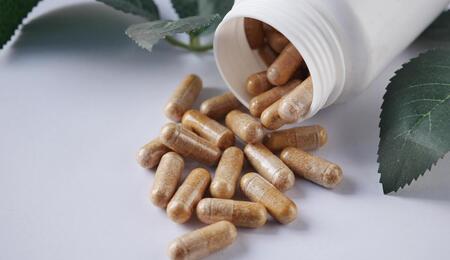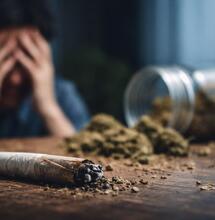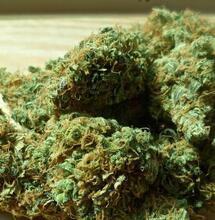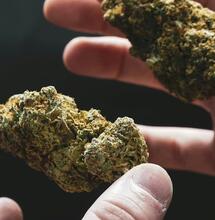Medicinal Cannabis in Combo with Other Meds

A lot of people try medicinal cannabis to aid their sleep or ease pains in the body. Whether it’s THC or CBD in question, cannabis products have shown to work pretty well. Still, consuming cannabis when you are also taking other medications might not be the smartest idea of all. Interactions between cannabis and certain prescription drugs can be dangerous. In some cases though, cannabis can replace the prescription drug altogether. So, it’s better to use either cannabis or the other medicine, but probably not the two together.
You probably remember that you’re not supposed to have grapefruit when taking certain medications. The issue with grapefruit is that it can inhibit the metabolic process in the body, either quickly destroying the medicine in the digestive tract or making it stay for prolonged time, thus worsening the person’s health. It’s a similar story with cannabis and prescription medicines.
Combining weed with other meds can have some serious side effects, especially when you don’t mind the quantity of THC or CBD that enters the body. The more cannabinoids pile up in the body, the more chances of troubling interactions with prescription medicines, which can lead to cardiac or pulmonary complications, or feeling sick, or in some cases visits to the ER. Most of these complications can be avoided.
Which Drugs Have Dangerous Interactions with Cannabis?
There are several groups of medications that can cause really bad reactions with cannabis. Below are some of the most commonly prescribed meds that patients should avoid combining with cannabis:
- Pain medications (e.g., Codeine, Percocet, Vicodin, Tylenol, Motrin)
- Psychiatric medications (e.g., Prozac, Elavil, Zoloft)
- Seizure medications (e.g., Depakine, Tegretol, Topamax)
- Sedatives (e.g., Ambien, Benadryl, Clobazam)
- Blood thinners (e.g., Warfarin, Coumadin, Plavix, Heparin)
- Bronchodilators (e.g., Theophylline)
- Anti-anxiety meds (e.g., Xanax, Valium)
Why Is There a Problem?
The body uses the same set of enzymes to process all substances that end up in the digestive system. The problem appears when cannabinoids, such as THC and CBD, begin to block the enzymes from doing their job.
The same enzymes that process THC and CBD in the liver also metabolize over 70% of some of the most commonly used prescription drugs. When combining cannabis with other medications, there’s always the risk that some of the cannabinoids will amplify the effects of some prescription drugs, or cause the medication to flush through the system all too quickly, as if you didn’t consume it all.
What Happens at Chemical Level?
A recent research published in the journal Drug Metabolism and Disposition illustrates the problematic interaction between cannabinoids such as TCH and CBD and other prescription drugs. The research entails two lab reports, one of which looked at a group of enzymes known as cytochrome P450s (CYPs), and the second looked at an enzyme group called UDP-glucuronosyltransferases (UGTs).
It takes less than an hour for THC and CBD to be processed in the digestive tract, and after that they leave behind by-products that can stay in the body for several days and weeks. The CYPs are in function during the early stages of processing the cannabinoids, while the UGTs are involved later on.
In their bid to see how the cannabinoids might interfere with the work of the enzymes and their ability to metabolize other drugs, the researchers used cultured human kidney cells to test each enzyme.
The lab work showed that the major THC metabolites inhibited key CYP enzymes, some of which facilitate important functions in the liver. The cannabinoids, and especially CBD, were also found to inhibit some of the most important UGT enzymes in the liver. CBD further blocked three more enzymes that account for over 90% of UGT metabolism in the kidney, responsible for clearing toxins and some drugs from the body.

How Powerful Interactions Can Be?
It’s been known for quite some time that cannabis could interact with other drugs. The recent scientific research simply illustrates what happens in those interactions. Even with very beneficial cannabis drugs, such as Epidiolex which has been FDA-approved, it can affect how enzymes work.
Still, it does matter how much the person is exposed to both cannabis and other prescription medicines. It’s the consistent exposure to both that can lead to unwanted health complications. If it’s only taking a few puffs, that’s really no different than drinking a glass of beer while still on medications. The effect will most likely be mild.
What cannabinoids are in the weed product also matters. If it’s CBD, it will inhibit the metabolic process. If it’s THC, it will speed up the process. CBD can make the blood levels of other drugs increase, and THC can make those levels decrease.
Which Are the “Red Flag” Interactions?
The most serious interaction is the one between cannabis and warfarin, which is a blood-thinner. Since CBD can increase the level of other drugs, the presence of both CBD and warfarin in the body can be in some cases lethal.
Mixing cannabis and sedatives, such as clobazam, can cause intoxication. With bronchodilators such as Theophylline, cannabis can reduce their efficacy, thus the patient receives little to no benefit from the drug.
With over-the-counter pain medicines, such as Ibuprofen, cannabis can again increase their toxicity. Pain meds are already highly toxic for the kidney and liver. When cannabis slows down the metabolism, the toxins stay longer in the body, doing organ damage. On the other hand, many times, cannabis can entirely replace anti-pain medicines (given that the person does not take any other drugs, for example antidepressants or anticonvulsants).
Final Thoughts
See cannabis as sort of how you see alcohol. When you are on antibiotics, you are not supposed to drink alcohol. Same as with other therapies. While you are on therapy with prescription medications, refrain from indulging in weed. If you think that cannabis can help treat your medical condition better than other meds, ask your doctor how to proceed, but don’t mix the two together. Always talk with your family doctor or a pharmacist when you get a new prescription. Just like you ask if there would be a problem if you take with it certain foods or other medicines, ask if it’s safe to use cannabis.
Also read on Soft Secrets:
- Suffering from Complaints? - Try Medicinal Cannabis.












